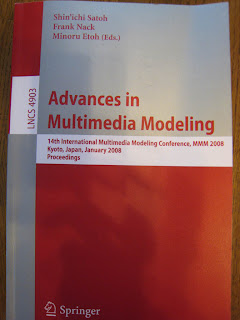 Last week, I was in Kyoto to participate MMM2008 for which I served as program co-chair. We published the proceedings as Lecture Notes in Computer Science through Springer Verlag.(LNCS) That conference was successful in terms of enthusiastic participants over the world, fruitful discussions, and demonstrations in corporation with Kyoto University.
Last week, I was in Kyoto to participate MMM2008 for which I served as program co-chair. We published the proceedings as Lecture Notes in Computer Science through Springer Verlag.(LNCS) That conference was successful in terms of enthusiastic participants over the world, fruitful discussions, and demonstrations in corporation with Kyoto University.
One disappointing thing was that the number of submitted papers was decreased more than 50%, comparing the previous MMM2007 conference.
Can you guess why?
One plausible reason is that LNCS has been kicked out from Journal Citation Index of Thomson ISI. As from January 2007, LNCS books are no longer listed in the ISI Journal Citation Index.
It seems that people especially in academia tend to work for papers cited in that list.
If not cited, the efforts may not be evaluated properly in their feeling about the score, and therefore we’ve got the less number of submission.
According to Wikipedia,the Impact factor, often abbreviated IF, is a measure of the citations to science and social science journals. It is frequently used as a proxy for the importance of a journal to its field.
In a nutshell, a published paper is evaluated in terms of Impact Factor (IF) and nowadays, IF is going to be used to measure the performance of faculty members in academia and researchers in industry. If you wrote four papers with IF of 1.0, IF of 2.0, IF of 2.5, IF of 1.5 and those were accepted in 2007, you would have got total IF of 7.0 points! You might be promoted owing to those figures, and might not be, depending how much score you’ve got until now.
There would have been much debate. Once we set an objective function, researchers, who are typically wise and clever especially in computer science, try to tune themselves to get more scores in academic activities.
I saw such backfires in many occasions of human resource management when I was in U.S. I believe the performance evaluation should be somewhat subjective so that we can avoid “over-fitting” syndrome among researchers. The leaders in government, faculty, and industry should have their own view and insights to lead the organization. The organization can be governed by not “scores” but “views”!
Researchers cannot be evaluated by any automatic objective measurement. Fair, agreeable and infallible OBJECTIVE measures have never existed.
I don’t trust the universities who are using IMACT FACTOR for evaluation of academic achievement performance. The universities should self-govern themselves by their views and visions which lead their members to work harder their REAL IMPACT on business, industry and welfare toward happiness of supporting people.
Thus, the evaluation should be high-minded subjective.
1/13/2008
Impact Factor and Leadership
Subscribe to:
Post Comments (Atom)





No comments:
Post a Comment